What is a VoIP Number? All You Need to Know
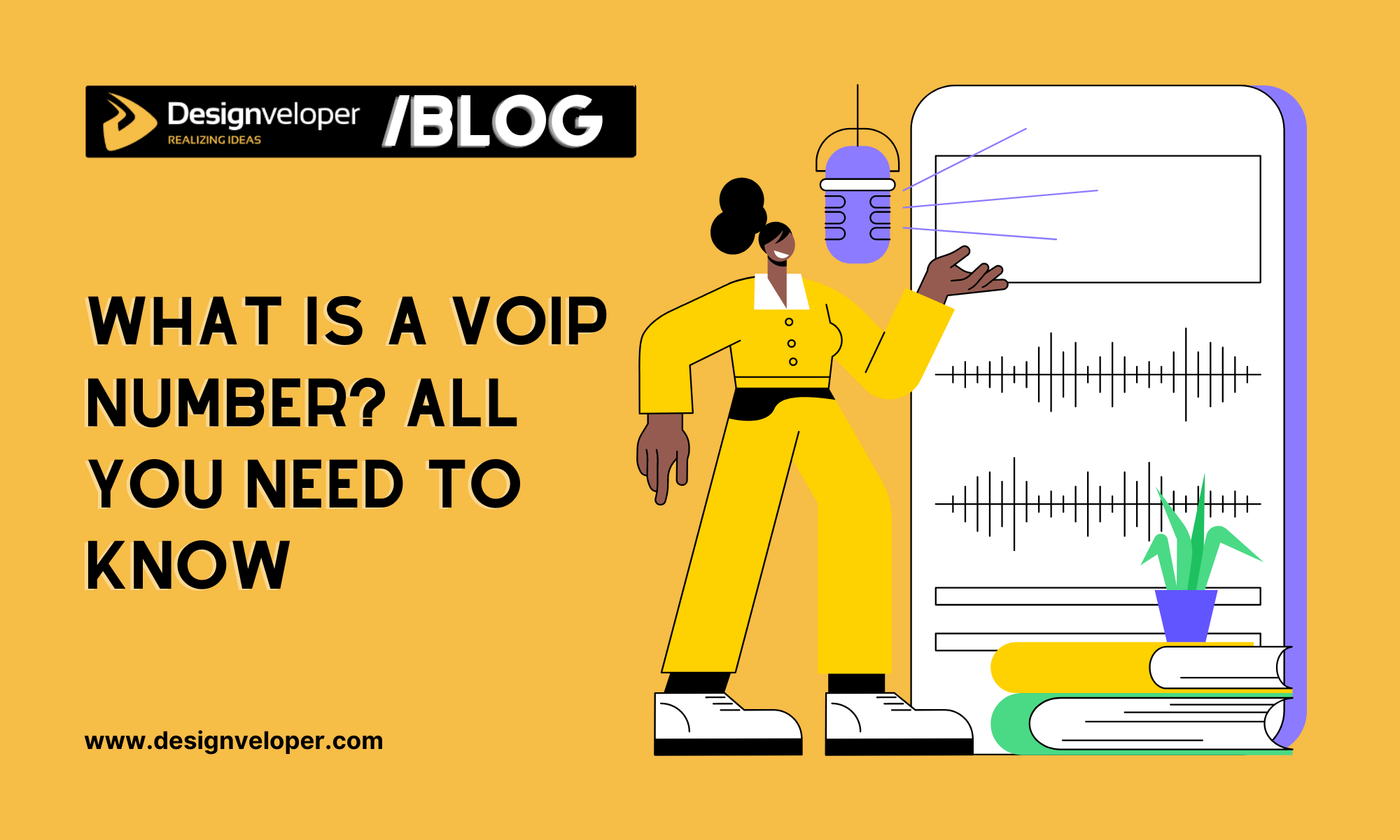
Communication is the lifeblood of any business. Today, many companies choose VoIP numbers as the perfect substitute for bulky landlines! Accordingly, you can make and receive business calls from anywhere without Internet access. So, what is a VoIP number? And how does it work for your business communication? Let’s find out the answers in our detailed guide!
What is a VoIP Number?
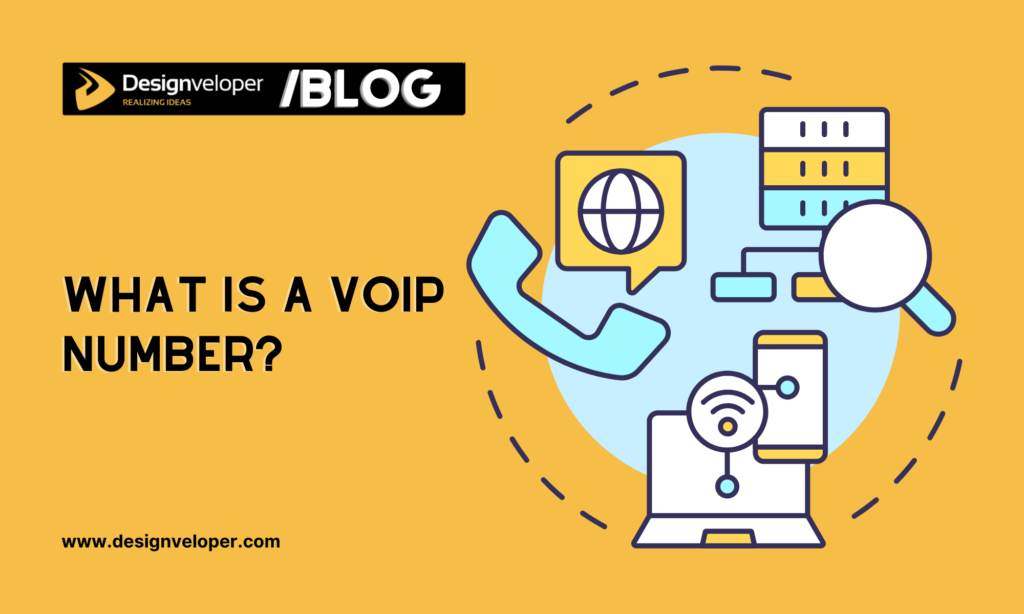
A VoIP number is a virtual phone number that runs over the Internet instead of traditional phone lines. The technology behind this number is VoIP, short for Voice over Internet Protocol. It removes the need for physical devices. Instead, it allows for communication by converting voice signals into data and delivering them digitally. This makes VoIP numbers ideal for remote work and global communication.
How Does a VoIP Number Work?
You’ve understood what a VoIP number is. However, how does it help you make and receive calls? Let’s dig deep into this process:
Making a Call
To make a VoIP call, start by dialing a number on your device. Your voice is converted into data packets. These packets travel over the internet to the VoIP service provider. The provider then sends the call to the destination phone number. This could be a VoIP number, a mobile phone, or a landline. The recipient’s device converts the data back into sound. You can then have a conversation just like on a landline.
Receiving a Call
When someone calls your VoIP number, the VoIP provider gets the incoming signal. It converts the data back into voice and sends it to your VoIP device, like your smartphone or computer. When your device rings, you can answer and talk just like on a traditional landline.
Why Does Your Business Need a VoIP Number?
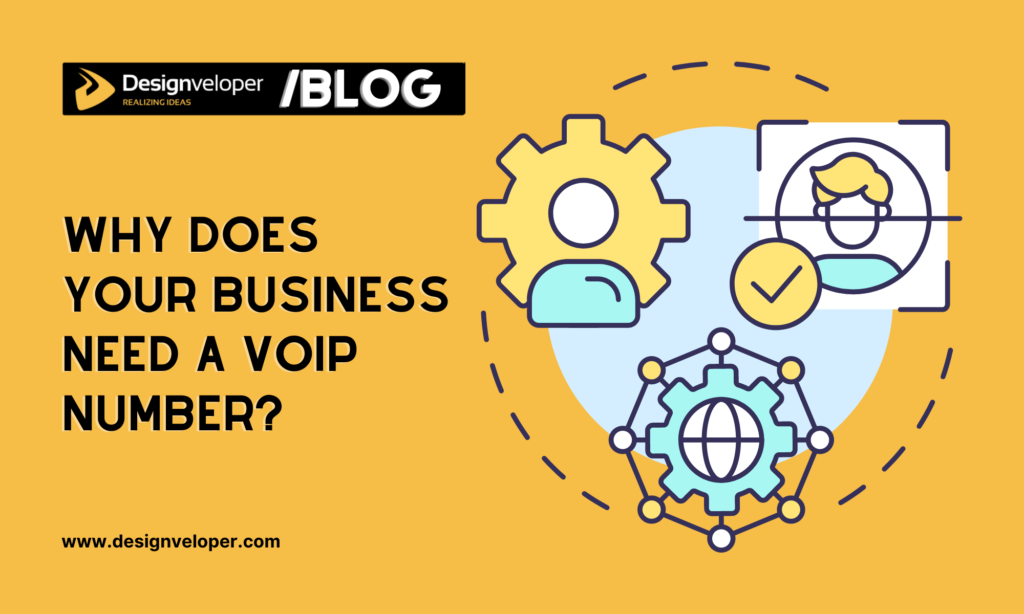
In today’s world, staying connected and offering great customer service is key to success. VoIP numbers can give your business a big advantage.
- Cost Savings: VoIP services usually cost less than traditional landlines. You avoid expensive per-minute charges. Bundled plans include features like voicemail and call forwarding. These can save you money over time.
- Scalability: Landlines require complex and costly infrastructure upgrades when your business grows. Meanwhile, VoIP systems easily scale with your growing team and communication demands.
- Remote Work: VoIP numbers empower you to work from anywhere with an internet-connected device like a smartphone or computer. Accordingly, you can make and receive any business call, fostering a more flexible and productive work environment.
- Enhanced Customer Services: VoIP numbers offer features beyond basic calling, like anonymous call rejection, auto-dialers, and call analytics. These features ensure you detect spam calls, improve response times, and showcase a professional image to your customers.
- Improved Communication & Collaboration: Many VoIP systems integrate smoothly with popular business software like CRM or ERP. This enables you to streamline communication workflows, track call history, and gain meaningful insights into customer interactions. For this reason, you can foster communication and collaboration within your team.
With these benefits, the demand for VoIP is rapidly increasing. This leads to its market expanding at a CAGR of 10.2% during the forecast period 2022-2032.
When Shouldn’t You Need a VoIP Number?
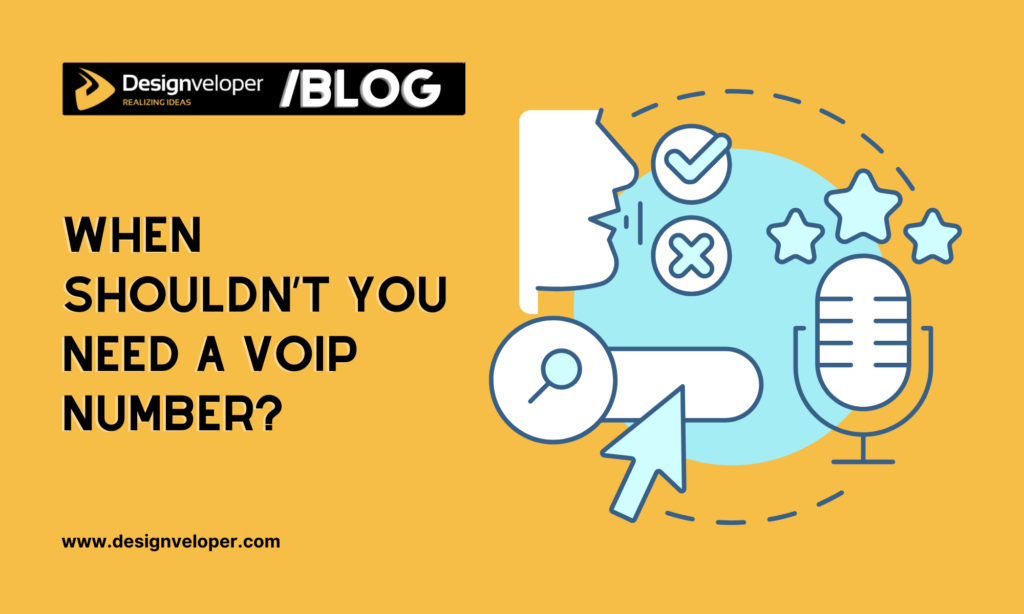
VoIP numbers offer many benefits. Yet, in some cases below, a traditional landline might be better for your business.
- Extremely Low Call Volume: If your business has very few calls, a basic landline might be enough. The cost savings with VoIP may not be significant.
- Limited or Unreliable Internet Access: VoIP needs a strong, stable internet connection. If your internet is limited or unreliable, VoIP call quality might suffer. A landline could be more dependable.
- Highly Regulated Industries: Industries like finance or healthcare have strict rules about data security and call recording. Ensure your VoIP provider meets these standards. You may need advice from legal or IT experts to decide if a landline is better for compliance.
- Existing Landline Contracts: If you have a long-term landline contract with favorable rates, switching to VoIP may not make sense.
- Preference for Simplicity: If your communication needs are basic and you don’t need advanced features, a landline might be simpler and sufficient.
Bonus: Common FAQs About VoIP Numbers
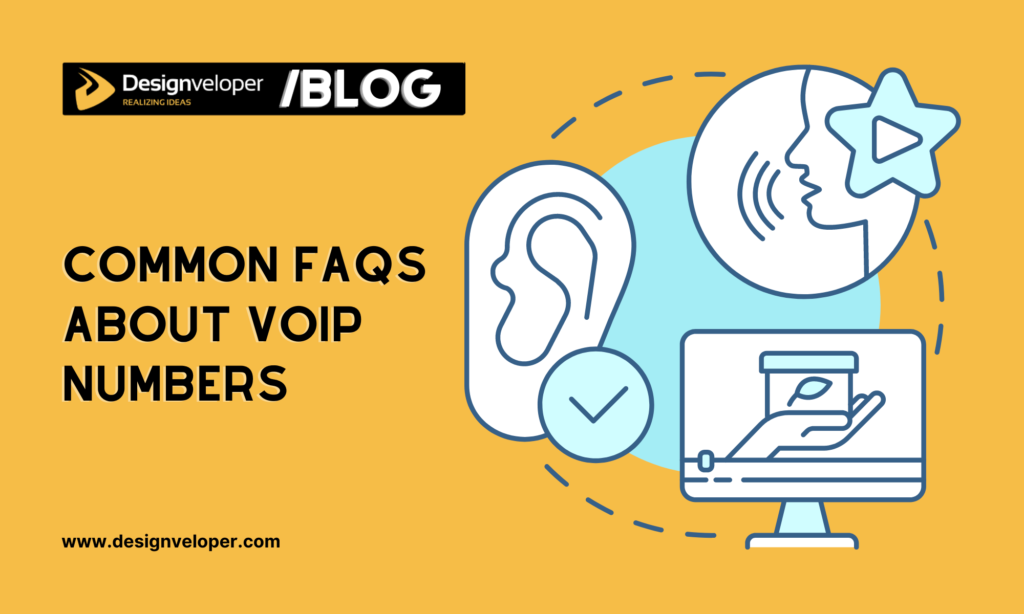
Apart from when you should and shouldn’t use a VoIP number, we’ll dive into other aspects of these numbers through the following questions:
Question 1: Is There Any Difference Between VoIP Numbers vs. Landlines?
The answer is yes. Both VoIP numbers and landlines enable you to make and receive calls. However, they operate in basically different ways. Here’s a breakdown of the five key differences to help you better understand their differences:
| Differences | VoIP Number | Landline |
| Technology | Use the Internet to transmit voice calls as data packets. | Depend on a physical network of wires. This network connects your phone directly to the telephone company’s infrastructure. |
| Cost | Generally more cost-effective, especially for long-distance calls. Further, features like voicemail, call forwarding, and even video conferencing are often added to a flat monthly fee. | Often include installation fees, monthly service charges, and potentially additional costs for features like call forwarding. |
| Flexibility | Offer greater flexibility and remote work capabilities. You can make and receive calls from any device, whether a smartphone, computer, or VoIP desk phone. | Restrict calls to the physical location where the phone is installed. |
| Scalability | Easily scalable. As your business grows, you can simply add more VoIP lines to your existing plan without any complex modifications. | Scaling a landline system typically requires extra hardware and installation costs. |
| Features | Offer advanced features like voicemail transcription, call routing options, auto attendants, and integration with business software (e.g., CRM). | Provide basic calling features like call waiting and caller ID. |
Question 2: Can I Track a VoIP Number?
Yes, you can track VoIP calls like traditional landline calls in case of emergency and law enforcement. This ensures the safety of VoIP users.
Question 3: Are VoIP Numbers Free?
Several VoIP providers offer a free basic phone number. However, they also charge you for toll-free vanity numbers that spell out a company’s name in digits (e.g., 1-800-FLOWERS if a company is FLOWERS). Further, you need to pay a monthly subscription fee for a whole VoIP system that covers your phone number(s), voicemail, call recording, and other features.
Question 4: Are VoIP Numbers Legal?
VoIP numbers are completely legal. It simply uses the Internet to transmit voice data rather than traditional phone lines. Further, if you choose a reputable VoIP provider that complies with regulations in your specific industry, there are no legal concerns regarding VoIP calls.
Question 5: Can VoIP Work Without Wifi?
VoIP can’t work well without stable internet access. However, various VoIP providers now provide some workarounds to ensure some levels of VoIP functionality during internet outages.
Accordingly, they offer features like Backup Internet Connection to automatically move VoIP operations to the backup or Call Continuity to forward VoIP calls to your designated mobile number. Further, some providers offer Unified Communications as a Service (UCaaS). This cloud-based service helps you receive messages even when the Internet gets down.
How to Integrate VoIP with Existing Systems
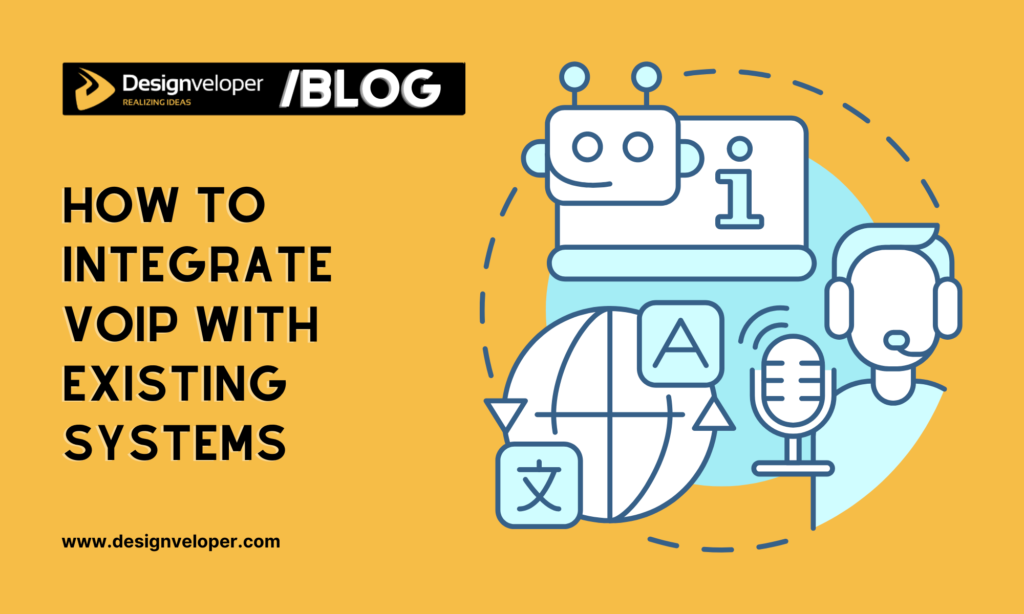
Today, you can integrate VoIP systems with your existing business software, like CRM (Customer Relationship Management). This integration enables you to share data and automate tasks with ease. Here’s how:
- Improved Customer Service: When a customer calls your business, their contact information from CRM automatically pops up on a rep’s screen. This allows the rep to access relevant customer history (e.g., past notes or interactions) to personalize the call.
- Streamlined Data Tracking & Reporting: All call details (e.g., notes, duration, and recordings) are automatically logged in the CRM. This gets rid of manual data entry and offers valuable insights into customer interactions and agent performance.
- Enhanced Call Routing: Based on customer information or call history, the VoIP system can automatically route the call to the right rep. With this CRM integration, reps can start a call directly from customer records within the CRM instead of finding and manually dialing a VoIP number.
Protecting Your Data with VoIP Integration
Although VoIP integration provides many immense benefits, you should be cautious about data security related to this incorporation. For example, when integrating VoIP with other systems, you may be creating some points of entry for potential attackers. Further, during calls, if customer information and voice data transmitted between systems are not properly secured, hackers can exploit it and gain access to such data.
Therefore, you should consider the following measures to address these risks:
- Select Secure Providers: If you assign VoIP integration or development to an outsourcing agency, choose a reputable one with a strong track record of data security and compliance with regulations like HIPAA or GDPR (depending on your industry).
- Leverage Security Practices: You should ensure the VoIP system and business software use encryption to protect data. This makes it unreadable even if attacked. Further, you need to implement strict access controls within these systems and keep them regularly updated with the latest security patches.
- Employee Training: Apart from the two mentioned measures, you should educate your employees about best practices for data security. These practices may involve using strong passwords, being careful with clicking on any links, and more.
Designveloper: Your Trusted VoIP Provider

So, are you looking for a reliable VoIP service provider that puts data security in mind? Designveloper is here to empower your business with secure, feature-rich VoIP solutions. Here are some VoIP services we offer:
- Custom VoIP Apps: We build VoIP apps tailored to your unique needs. Our team uses advanced technology to create reliable and scalable VoIP solutions. These apps support seamless communication for your business. Whether for internal communication, customer support, or other purposes, we have the expertise to deliver a solution that fits your needs.
- VoIP Customer Service: Our VoIP solutions can transform your customer support experience. We integrate VoIP seamlessly with your existing systems. Features like call routing, IVR (Interactive Voice Response), and real-time call analytics enhance communication. They improve customer satisfaction and streamline support processes.
- VoIP Remote Workers: We also support seamless communication for remote workers, regardless of location. Our VoIP systems help your remote teams stay productive and connected with such features as virtual extensions, mobile apps, and video conferencing. Further, the robust security measures and reliable connectivity of VoIP systems enable effective collaboration and better result delivery.
So, are you ready to experience the power of VoIP? Contact us today to schedule a consultation and explore our comprehensive VoIP solutions. With years of experience working with VoIP, we’ll help you select the perfect plan to foster your business communication and efficiency.

















































